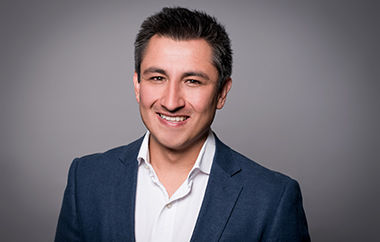PhD in Energy Systems and Climate Change at Aveiro University, Portugal
Research focus: integration of thermochemical conversion processes to upcycle agro-residues into carbon-related products and renewable thermal energy
Mario coordinates a collaborative project that groups research centres and universities in Portugal and Ecuador, non-governmental organisations, government ministries, farmers associations, peasant leaders, industrial guilds, and international innovation agencies.
Mario develops technology that supports the transformation of agro-industries of developing countries into early-stage biorefineries. In order to transfer technology from the laboratory to industry, he founded the start-up “Andes Bioenergy”, which has already installed several sustainable energy systems within the coffee, cacao, and palm oil sector in Ecuador. In order to understand and at the same time affect change towards a more sustainable future, Mario is currently integrating a transformative research approach into his academic work with the support of the Integrative Research Institute on Transformations of Human-Environment Systems (IRI THESys) of the Humboldt University of Berlin.
2019 ISC3centre Award for Entrepreneurial Spirit in Sustainable Chemistry, Germany
CV as submitted for the Green Talents award (2018):
Aveiro University, Portugal
Research focus: integration of pyrolysis and combustion processes to produce soil amendments (e.g. biochar) and renewable thermal energy from agricultural waste
In Mario Alejandro’s home country of Ecuador, subsidies on fossil fuels have ensured high dependency on diesel, gasoline, fuel oil and LPG, thus negating the government’s stated aim to mitigate climate change by limiting GHG emissions. Mario Alejandro seeks to support governmental efforts to promote the implementation of renewable energy systems by developing energy conversion devices that can use the residual biomass generated in the agricultural and agro-industrial sector to produce renewable thermal energy and soil amendments through thermochemical conversion processes.
Mario Alejandro’s research project can be divided into three stages. In the first stage, he used thermo-economic methods to weigh up government subsidies to fossil fuel against tax incentives promoting alternative energy sources. From this analysis, he ascertained that in Ecuador, palm oil kernel shell (PKC) could be an environmentally friendly and cost-effective replacement fuel that could be used in the industrial and commercial sector. Mario Alejandro then went on to build a horizontal burner prototype using mainly open source hardware and software platforms and was able to demonstrate the feasibility of PKC as solid fuel for thermal energy production. In the third and final stage of his research, he designed a prototype auger reactor including a pyrolytic gas burner that integrates with the horizontal burner prototype giving way to a novel portable and continuous pyrolysis reactor. The pyrolysis reactor has been proven to make effective use of low bulk density residual biomass to produce thermal energy and biochar, without resorting to external heat sources, and complying with the European emissions standards. Mario Alejandro coordinates this collaborative project that uses participative-action research methodologies and groups research centres and universities in Portugal, Brazil and Ecuador. The project also groups non-governmental organisations, private companies and several indigenous and peasant organisations.
The jury was impressed by Mario Alejandro’s enthusiasm to put his research into practice as quickly as possible, so that agroindustrial facilities currently leaded by indigenous and peasant communities living in fragile ecosystems can get access to state of the art technology. To this end, he has endeavoured to take the scientific method out of the laboratory and into the technology sector, by founding the start-up “Andes Bioenergy”. Mario Alejandro’s device has already generated significant interest from several agro-industrial companies, meaning it could be put to large-scale use in the near future






